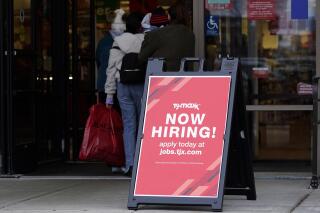US job openings slip, but employment landscape remains solid

FILE - Hiring sign is displayed outside of a retail store in Vernon Hills, Ill., Saturday, Nov. 13, 2021. U.S. employers advertised fewer jobs in May 2022 as the economy has shown signs of weakening, though the overall demand for workers remained strong. Employers advertised 11.3 million jobs at the end of May, the Labor Department said Wednesday, July 6, 2022, down from nearly 11.7 million in March, the highest level on records that date back more than 20 years. (AP Photo/Nam Y. Huh, File)
WASHINGTON (AP) — U.S. employers advertised fewer jobs in May amid signs that the economy is weakening, though the overall demand for workers remained strong.
Employers posted 11.3 million job openings at the end of May, the Labor Department said Wednesday, down from nearly 11.7 million in April. Job openings reached 11.9 million in March, the highest level on records dating back more than 20 years. There are nearly two job openings for every unemployed person, a sharp reversal from the historic pattern: Before the pandemic, there were always more unemployed people than available jobs.
The figures reflect the unusual nature of the post-pandemic economy: Inflation is hammering household budgets, forcing consumers to pull back on spending, and growth is weakening, heightening fears the economy could fall into recession. Yet companies are still scrambling to add workers. Demand has been particularly strong in travel- and entertainment-related services.
“This is not what a recession looks like,” said Nick Bunker, director of economic research at employment website Indeed’s Hiring Lab. “Clouds can move in quickly and darken the outlook for the U.S. labor market, but for now, the sun is still shining.”
Americans are also far more likely to quit their jobs than before the pandemic, mostly for new jobs at higher pay, another trend that is pushing up incomes. The number of people quitting fell to 4.3 million in May, down about 60,000 from April and below a record 4.5 million last November, but still historically high.
Economists are closely monitoring the jobs opening figures for signs the labor market is cooling, which could bring down inflation. With companies posting so many available positions, they have also been raising pay and offering more benefits to attract and keep workers. Higher labor costs have, in turn, contributed to pushing up prices, with inflation now at 40-year highs.
The Federal Reserve has targeted the nearly record-high job openings as evidence that the economy has overheated, and is rapidly lifting the short-term interest rate it controls to cool consumer and business spending. Fed Chair Jerome Powell hopes that weaker spending will reduce demand for workers, lower job openings and wage increases, and bring down inflation.
For now, labor demand remains strong. Last month, the government said that employers added 390,000 jobs in May, a healthy increase, while the unemployment rate stayed at 3.6%, near a 50-year low.
Wednesday’s report, known as the Job Openings and Labor Turnover Survey, or JOLTS, provides overall data for hiring, job postings, and the number of people quitting their jobs. On Friday, the government will release its monthly jobs report, which includes net job gains and the unemployment rate.
There are signs that hiring and the demand for labor may cool in the coming months. On Friday, the June jobs report is expected to show that employers added 275,000 jobs, which would be a solid increase but the smallest in more than a year.
And Homebase, a company that provides payroll and hiring software for small businesses, says it has seen a 16% drop in new job postings by its customers in June compared with May. A separate survey of 400 of its clients finds that while most plan to add jobs this year, the proportion who say they won’t add jobs has doubled to 8% in June compared with January of this year. And the proportion who plan to add more than 11 workers has fallen sharply, to nearly 19%, down from 30% in January.
“We see some anticipation of softness and a weakening need for expanding employment,” said Jason Greenberg, head economist at Homebase.
Consumer spending, the economy’s biggest engine, fell in May after adjusting for inflation, the first such drop since December. That could drag down growth in the April-June quarter, with some economists projecting the economy could shrink for the second quarter in a row.
And a survey of executives at manufacturing firms found that last month new orders actually declined compared with May, as Americans cut back their spending on manufactured goods. Yet a separate survey Wednesday of restaurants, banks, and other companies that provide services showed growth remained solid.
